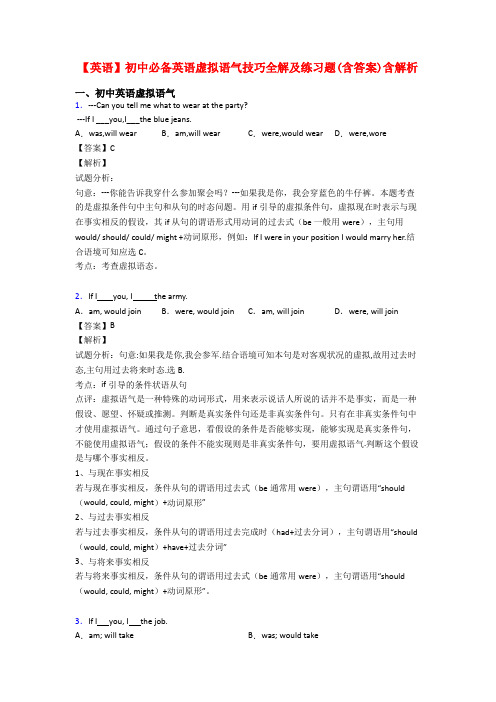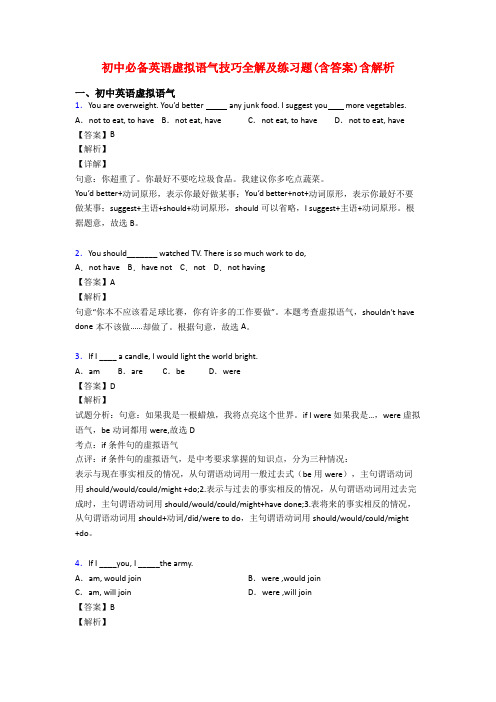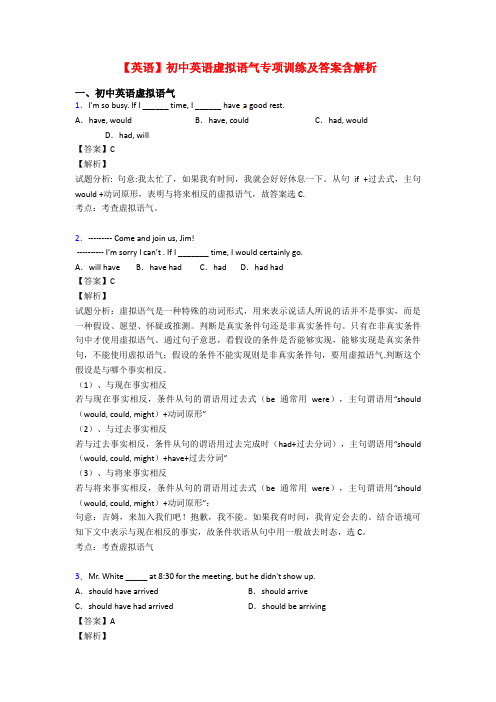初中虚拟语气讲解及专项练习与标准答案(带解析)
虚拟语气解析以及练习题答案详细解答

虚拟语气解析及练习与答案详解虚拟语气一、虚拟语气的运用练习题及答案解释The millions of calculations involved, had they been done by hand,______all practical value by the time they were finished.A.could loseB. would have lostC. might loseD. ought to have lost解析:这个句子中含有一个省略if,把助动词提前到主语they之前的虚拟条件句,该条件句表示对过去情况的假设,而主句中by the time they were finished表明主句也应该是对过去发生的情况的假设,因而应该选(B)would have lost为正确答案。
2. Had Paul received six more votes in the last election, he our chairman now.A. must have beenB. would have beenC. wereD. would be解析:这道题目是一个混合虚拟语气的句子。
条件句省略了if,把助词had提前到主语前面,表示对过去情况的假设,而主句中now表明了对现在情况的假设,所以应选would(should, could, might)+动词原形这种表达形式。
四个选项中只有(D)是正确表达形式,故为正确答案。
3. If you Jerry Brown until recently, you’d think the photograph on the right was strange.A. shouldn’t contactB. didn’t contactC. weren’t to contactD. hadn’t contacted解析:until recently,因此(D)是正确答案,而主句是隐含的对现在情况的假设,该句是一个混合虚拟条件句。
英语虚拟语气技巧(很有用)及练习题及解析

英语虚拟语气技巧(很有用)及练习题及解析一、初中英语虚拟语气1.If I you, I’d take a small present for her.A.am B.is C.was D.were【答案】D【解析】试题分析:虚拟语气是一种特殊的动词形式,用来表示说话人所说的话并不是事实,而是一种假设、愿望、怀疑或推测。
其主要有三种结构:1、与现在事实相反:若与现在事实相反,条件从句的谓语用过去式(be通常用were),主句谓语用“should (would, could, might)+动词原形” 2、与过去事实相反:若与过去事实相反,条件从句的谓语用过去完成时(had+过去分词),主句谓语用“should (would, could, might)+have+过去分词”。
3、与将来事实相反:若与将来事实相反,条件从句的谓语用过去式(be通常用were),主句谓语用“should (would, could, might)+动词原形”。
句意:如果我是你,我会给她带一件小礼物。
结合语境可知本句描述的是与现在相反的事实,故选D。
考点:考查虚拟语气。
2.If I _______ you, I would say another student could do it better.A.was B.were C.were D.are【答案】B【解析】【详解】句意:如果我是你,我会说另一个学生可以把它做得更好。
考查虚拟语气。
根据句意可知“现在事实”相反,此句是虚拟语气,be动词使用were;故选A。
3.Mr. White _____ at 8:30 for the meeting, but he didn't show up.A.should have arrived B.should arriveC.should have had arrived D.should be arriving【答案】A【解析】试题分析:句意:怀特先生本来应该在8:30到会,但他却没有出现。
【英语】初中必备英语虚拟语气技巧全解及练习题(含答案)含解析

【英语】初中必备英语虚拟语气技巧全解及练习题(含答案)含解析一、初中英语虚拟语气1.---Can you tell me what to wear at the party?---If I ___you,I___the blue jeans.A.was,will wear B.am,will wear C.were,would wear D.were,wore【答案】C【解析】试题分析:句意:---你能告诉我穿什么参加聚会吗?---如果我是你,我会穿蓝色的牛仔裤。
本题考查的是虚拟条件句中主句和从句的时态问题。
用if引导的虚拟条件句,虚拟现在时表示与现在事实相反的假设,其if 从句的谓语形式用动词的过去式(be 一般用were),主句用would/ should/ could/ might +动词原形,例如:If I were in your position I would marry her.结合语境可知应选C。
考点:考查虚拟语态。
2.If I you, I the army.A.am, would join B.were, would join C.am, will join D.were, will join【答案】B【解析】试题分析:句意:如果我是你,我会参军.结合语境可知本句是对客观状况的虚拟,故用过去时态,主句用过去将来时态.选B.考点:if引导的条件状语从句点评:虚拟语气是一种特殊的动词形式,用来表示说话人所说的话并不是事实,而是一种假设、愿望、怀疑或推测。
判断是真实条件句还是非真实条件句。
只有在非真实条件句中才使用虚拟语气。
通过句子意思,看假设的条件是否能够实现,能够实现是真实条件句,不能使用虚拟语气;假设的条件不能实现则是非真实条件句,要用虚拟语气.判断这个假设是与哪个事实相反。
1、与现在事实相反若与现在事实相反,条件从句的谓语用过去式(be通常用were),主句谓语用“should (would, could, might)+动词原形”2、与过去事实相反若与过去事实相反,条件从句的谓语用过去完成时(had+过去分词),主句谓语用“should (would, could, might)+have+过去分词”3、与将来事实相反若与将来事实相反,条件从句的谓语用过去式(be通常用were),主句谓语用“sh ould (would, could, might)+动词原形”。
初中必备英语虚拟语气技巧全解及练习题(含答案)含解析

初中必备英语虚拟语气技巧全解及练习题(含答案)含解析一、初中英语虚拟语气1.You are overweight. You’d better any junk food. I suggest you more vegetables. A.not to eat, to have B.not eat, have C.not eat, to have D.not to eat, have 【答案】B【解析】【详解】句意:你超重了。
你最好不要吃垃圾食品。
我建议你多吃点蔬菜。
You’d better+动词原形,表示你最好做某事;You’d better+not+动词原形,表示你最好不要做某事;suggest+主语+should+动词原形,should可以省略,I suggest+主语+动词原形。
根据题意,故选B。
2.You should_______ watched TV. There is so much work to do,A.not have B.have not C.not D.not having【答案】A【解析】句意“你本不应该看足球比赛,你有许多的工作要做”。
本题考查虚拟语气,shouldn't have done本不该做……却做了。
根据句意,故选A。
3.If I ____ a candle, I would light the world bright.A.am B.are C.be D.were【答案】D【解析】试题分析:句意:如果我是一根蜡烛,我将点亮这个世界。
if I were 如果我是…,were虚拟语气,be动词都用were,故选D考点:if条件句的虚拟语气点评:if条件句的虚拟语气,是中考要求掌握的知识点,分为三种情况:表示与现在事实相反的情况,从句谓语动词用一般过去式(be用were),主句谓语动词用should/would/could/might +do;2.表示与过去的事实相反的情况,从句谓语动词用过去完成时,主句谓语动词用should/would/could/might+have done;3.表将来的事实相反的情况,从句谓语动词用should+动词/did/were to do,主句谓语动词用should/would/could/might +do。
【英语】初中英语虚拟语气专项训练及答案含解析

【英语】初中英语虚拟语气专项训练及答案含解析一、初中英语虚拟语气1.I’m so busy. If I ______ time, I ______ have a good rest.A.have, would B.have, could C.had, would D.had, will【答案】C【解析】试题分析: 句意:我太忙了,如果我有时间,我就会好好休息一下。
从句if +过去式,主句would +动词原形,表明与将来相反的虚拟语气,故答案选C.考点:考查虚拟语气。
2.--------- Come and join us, Jim!---------- I’m sorry I can’t . If I _______ time, I would certainly go.A.will have B.have had C.had D.had had【答案】C【解析】试题分析:虚拟语气是一种特殊的动词形式,用来表示说话人所说的话并不是事实,而是一种假设、愿望、怀疑或推测。
判断是真实条件句还是非真实条件句。
只有在非真实条件句中才使用虚拟语气。
通过句子意思,看假设的条件是否能够实现,能够实现是真实条件句,不能使用虚拟语气;假设的条件不能实现则是非真实条件句,要用虚拟语气.判断这个假设是与哪个事实相反。
(1)、与现在事实相反若与现在事实相反,条件从句的谓语用过去式(be通常用were),主句谓语用“should (would, could, might)+动词原形”(2)、与过去事实相反若与过去事实相反,条件从句的谓语用过去完成时(had+过去分词),主句谓语用“should (would, could, might)+have+过去分词”(3)、与将来事实相反若与将来事实相反,条件从句的谓语用过去式(be通常用were),主句谓语用“should (would, could, might)+动词原形”:句意:吉姆,来加入我们吧!抱歉,我不能。
【英语】英语虚拟语气常见题型及答题技巧及练习题(含答案)及解析

【英语】英语虚拟语气常见题型及答题技巧及练习题(含答案)及解析一、初中英语虚拟语气1.If I______ you, I would take a small present..A.am B.was C.were D.are【答案】C【解析】试题分析:句意:如果我我你,我会那个小的礼物。
句中用虚拟语气,系动词用were,故选C。
考点:考查虚拟语气。
2.If I _______ you, I would say another student could do it better.A.was B.were C.were D.are【答案】B【解析】【详解】句意:如果我是你,我会说另一个学生可以把它做得更好。
考查虚拟语气。
根据句意可知“现在事实”相反,此句是虚拟语气,be动词使用were;故选A。
3.--What would you do if you ____ a million dollars?--I’d give it to the charityA.win B.won C.will win D.is to win【答案】B【解析】试题分析:句意:如果你赢了一百万美元,你要做什么?——我会把它捐给慈善机构。
结合语境可知条件从句中描述的是与将来相反的事实,故用一般过去时态,选B。
考点:if引导的条件状语从句点评:虚拟语气是一种特殊的动词形式,用来表示说话人所说的话并不是事实,而是一种假设、愿望、怀疑或推测。
判断是真实条件句还是非真实条件句。
只有在非真实条件句中才使用虚拟语气。
通过句子意思,看假设的条件是否能够实现,能够实现是真实条件句,不能使用虚拟语气;假设的条件不能实现则是非真实条件句,要用虚拟语气.判断这个假设是与哪个事实相反。
1、与现在事实相反若与现在事实相反,条件从句的谓语用过去式(be通常用were),主句谓语用“should (would, could, might)+动词原形”2、与过去事实相反若与过去事实相反,条件从句的谓语用过去完成时(had+过去分词),主句谓语用“should(would, could, might)+have+过去分词”3、与将来事实相反若与将来事实相反,条件从句的谓语用过去式(be通常用were),主句谓语用“should (would, could, might)+动词原形”:4.If I you, I the army.A.am, would join B.were, would join C.am, will join D.were, will join【答案】B【解析】试题分析:句意:如果我是你,我会参军.结合语境可知本句是对客观状况的虚拟,故用过去时态,主句用过去将来时态.选B.考点:if引导的条件状语从句点评:虚拟语气是一种特殊的动词形式,用来表示说话人所说的话并不是事实,而是一种假设、愿望、怀疑或推测。
【英语】中考英语虚拟语气专项练习及解析

【英语】中考英语虚拟语气专项练习及解析一、初中英语虚拟语气1. If I ______ you, I _____the job.A.was; will take B.was; would take C.were; would take D.were; will take 【答案】 C【解析】试题分析:句意:如果我是你,我就要这份工作。
If引导的句子是愿望时,用过去式表示,而且系动词用were,主句用would加原形。
故选C。
考点: 考查虚拟语气的用法。
2.If I _______ you, I would say another student could do it better.A.was B.were C.were D.are【答案】B【解析】【详解】句意:如果我是你,我会说另一个学生可以把它做得更好。
考查虚拟语气。
根据句意可知“现在事实”相反,此句是虚拟语气,be动词使用were;故选A。
3.Mr. White _____ at 8:30 for the meeting, but he didn't show up.A.should have arrived B.should arriveC.should have had arrived D.should be arriving【答案】A【解析】试题分析:句意:怀特先生本来应该在8:30到会,但他却没有出现。
should have done:本来应该做某事而实际上没做。
故选A考点:情态动词4.--What would you do if you ____ a million dollars?--I’d give it to the charityA.win B.won C.will win D.is to win【答案】B【解析】试题分析:句意:如果你赢了一百万美元,你要做什么?——我会把它捐给慈善机构。
结合语境可知条件从句中描述的是与将来相反的事实,故用一般过去时态,选B。
初中必备英语虚拟语气技巧全解及练习题(含答案)含解析

初中必备英语虚拟语气技巧全解及练习题(含答案)含解析一、初中英语虚拟语气1. If I ______ you, I _____the job.A.was; will take B.was; would take C.were; would take D.were; will take 【答案】 C【解析】试题分析:句意:如果我是你,我就要这份工作。
If引导的句子是愿望时,用过去式表示,而且系动词用were,主句用would加原形。
故选C。
考点: 考查虚拟语气的用法。
2.You should_______ watched TV. There is so much work to do,A.not have B.have not C.not D.not having【答案】A【解析】句意“你本不应该看足球比赛,你有许多的工作要做”。
本题考查虚拟语气,shouldn't have done本不该做……却做了。
根据句意,故选A。
3.--- If I_______ one million dollars, I would give it to medical research.---If I _______ you, I would give it to charity.A.will have, am B.would have, was C.had, were D.have, is【答案】C【解析】考察虚拟语气。
第一空,虚拟语气,与现在相反,用过去时。
第二空,虚拟语气,与现在相反,用过去时,be动词用were。
故选C4. If I went to the moon, I ______ bring something unusual back to the earth.A.couldB.willC.wouldD.shall【答案】C【解析】试题分析:此题考查if引导的条件状语从句的相关知识。
根据语境可知此句的含义是如果我去月球,我会带回一些不同寻常的东西。
- 1、下载文档前请自行甄别文档内容的完整性,平台不提供额外的编辑、内容补充、找答案等附加服务。
- 2、"仅部分预览"的文档,不可在线预览部分如存在完整性等问题,可反馈申请退款(可完整预览的文档不适用该条件!)。
- 3、如文档侵犯您的权益,请联系客服反馈,我们会尽快为您处理(人工客服工作时间:9:00-18:30)。
虚拟语气专练1.I enjoyed the movie very much. I wish I _____ the book from which it was made.A. have readB. had readC. should have readD. are reading2.You are late. If you _____ a few minutes earlier you _____ him.e would meetB. had come would have metC. come will meetD. had come would meet3.The two students talked as if they _____ friends for years.A. should beB. would beC. have beenD. had been4.It is important that I _____ with Mr. Williams immediately.A. speakB. spokeC. will speakD. to speak5.He looked as if he _____ ill for a long time.A. wasB. wereC. has beenD. had been6.If the doctor had come earlier the poor child would not _____.A. have laid there for two hoursB. have been lied there for two hoursC. have lied there for two hoursD. have lain there for two hours7.I wish that I _____ with you last night.A. wentB. could goC. have goneD. could have gone8.Let’s say you could go there again how _____ feelA. will youB. should youC. would youD. do you9.I can’t stand him. He always talks as though he _____ everything.A. knewB. knowsC. has knownD. had known10._____ the fog we should have reached our school.A. Because ofB. In spite ofC. In case ofD. But for11.If you had told me in advance I _____ him at the airport.A. would meetB. would had metC. would have metD. would have meet12.Mike can take his car apart and put it back together again. I certainly wish he_____ me how.A. teachesB. will teachC. has taughtD. would teach13.I would have told him the answer had it been possible but I _____ so busy then.A. had beenB. wereC. wasD. would be14.He’s working hard for fear that he _____.A. should fall behindB. fell behindC. may fall behindD. would fallen behind15.If it _____ another ten minutes the game would have been called off.A. had rainedB. would have rainedC. have seenD. rained16.He suggested that they _____ use a trick instead of fighting.A. ShouldB. wouldC. doD. had17.My father did not go to New York the doctor suggested that he _____ there.A. not wentB. won’t goC. not goD. not to go18.I would have gone to the meeting if I _____ time.A. had hadB. have hadC. hadD. would have had19.Would you rather I _____ buying a new bikeA. decided againstB. will decide againstC. have decidedD. shall decide against20.You look so tired tonight. It is time you _____.A. go to sleepB. went to sleepC. go to bedD. went to bed21.—Why didn’t you buy a new car —I would have bought one if I _____ enough money.A. hadB. have hadC. would haveD. had had22.If she could sew _____.A. she make a dressB. she would have made a shirtC. she will make a shirtD. she would had made a coat23._____ today he would get there by Friday.A. Would he leaveB. Was he leavingC. Were he to leaveD. If he leaves24.His doctor suggested that he _____ a short trip abroad.A. will takeB. would takeC. takeD. took25.The Bakers arrived last night. If they’d only let us know earlier_____ at the station.A. we’d meet themB. we’ll meet themC. we’d have met themD. we’ve met them26.If I _____ you I _____ more attention to English idioms and phrases.A. was shall payB. am will payC. would be would payD. were would pay27.We might have failed if you _____ us a helping hand.A. have not givenB. would not giveC. had not givenD. did not give28.The law requires that everyone _____ his car checked at least once a year.A. hasB. hadC. haveD. will have29.It is strange that he _____ so.A. would sayB. would speakC. should sayD. will speak30.Had I known her name _____A. or does she know mineB. and where does she liveC. she would be beautiful.D. I would have invited her to lunch.31.He has just arrived but he talks as if he _____ all about that.A. knowB. knowsC. knownD. knew32.If I _____ the money I would have bought a much bigger car.A.possessedB. ownedC. hadD. had had33.He was very busy yesterday otherwise he _____ to the meeting.A. would comeB. cameC. would have comeD. will come34.The librarian insists that John _____ no more books from the library before he returns all the books he has borrowed.A. will takeB. tookC. takeD. takes35.I left very early last night but I wish I _____ so early.A. didn’t leaveB. hadn’t leftC. haven’t leftD. couldn’t leave36.I do not have a job. I would find one but I _____ no time.A. hadB. didn’t haveC. had hadD. have37.I wish that you _____ such a bad headache because I’m sure that you would have enjoyed the concert.A. hadn’tB. didn’t have hadC. hadn’t hadD. hadn’t have38.He insisted that we all _____ in his office at one o’clock.A. beB. to beC. would beD. shall be39.Helen couldn’t go to France after all. That’s too bad. I’m sure she woul d have enjoyed it if _____.A. she’s goneB. she’ll goC. she’d goneD. she’d go40.I must go there earlier. John has suggested that I _____ an hour before the discussion begins.A. goB. shall goC. will goD. would go英语虚拟语气讲解语气(mood) 是一种动词形式,用以表示说话者的意图或态度。
